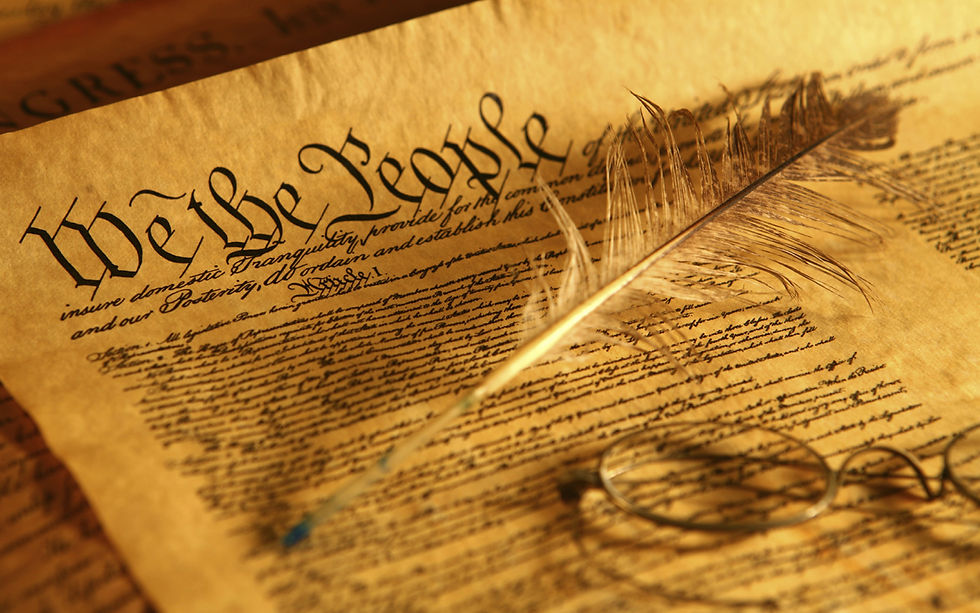What was the point of "Separation of Church and State"?
- Jim Richmond

- Dec 14, 2022
- 6 min read
Updated: Dec 15, 2022

Perhaps no phrase pertaining to the way our nation functions is as well known as “Separation of Church and State.” And perhaps no phrase is more misunderstood or misused as well. If you asked the common person on the street today what the phrase means, you would no doubt hear something like, “It means that religion can’t be brought into the public square.” Is that what the founders of the nation had in mind? Is that even what was meant by the letter that Thomas Jefferson sent to the Danbury Baptists?
To understand this issue correctly, we first have to understand the letter that the Danbury Baptists wrote to Thomas Jefferson. After Jefferson was elected, the Danbury Baptists wanted to be sure that the new President would continue to support the First Amendment that guaranteed “the free exercise” of religion and prohibited the Federal government from establishing a national religion. In response, Jefferson said:
“Believing with you that religion is a matter which lies solely between Man & his God, that he owes account to none other for his faith or his worship, that the legitimate powers of government reach actions only, & not opinions, I contemplate with sovereign reverence that act of the whole American people which declared that their legislature should ʺmake no law respecting an establishment of religion, or prohibiting the free exercise thereof,ʺ thus building a wall of separation between Church & State.”
Notice Jefferson wants to assure them that government will not be interfering with their ability to worship God as they see fit. Religion is a matter between a person and their God. In other words, government should not interfere with the exercise of religion. The Danbury Baptists were in the minority in Connecticut, as Congregationalism was the official religion of the state, which is why they were concerned about their First Amendment rights. Jefferson reinforces his commitment to the idea that the federal government will “make no law respecting an establishment of religion, or prohibiting the free exercise thereof,” and then immediately follows that with “thus building a wall of separation between Church and State.” He is obviously assuring them that the federal government is not going to pick one denomination of Christianity and enforce it on everyone. It is clear the purpose of the “wall” is to protect the free exercise of religion, not limit it. The “wall” was there to protect religion from control by the state, it was not intended to keep the practice and influence of religion out of the state.
There are a few assumptions about this phrase (Separation of Church and State) that are not true. The first is that it means that religion can’t play a factor in any public sector or in local or state affairs. Think about this for a moment - one of the greatest reasons the Danbury Baptists wrote the letter in the first place was because their state had an official religion. And this wasn’t unusual. In fact, over half of the original 13 states had official state religions, and all 13 included language about worshiping God (some even specifically name Jesus Christ) in their founding documents. Clearly the founders were only concerned about the establishment of a national religion. If “separation of Church and State” meant what it is now assumed to mean, over half of our original states would have been required to immediately drop their official endorsement of a particular denomination.
It is also assumed that the phrase, “Separation of Church and State,” is in the Constitution. It is not. It originated in Jefferson’s letter, but has been picked up by the Supreme Court in a few key decisions and interpreted in a way that does not fit with the First Amendment. The reference to this phrase in these decisions is what has enshrined it in Constitutional law. However, there can be little doubt that their interpretation of “Separation of Church and State” cannot possibly fit an accurate interpretation of the First Amendment. Why? Because their interpretation led to less free exercise of religion. Do we really believe that the founders’ (or Jefferson when he wrote this letter) intent in writing the First Amendment was to make sure that religion is pushed out of all public sectors? I don’t think that anyone, including people who like the outcome of these decisions by the Court, truly believe that was the purpose. Look at these quotes by several of our founding fathers concerning the place of religion in our nation:
“Of all the dispositions and habits which lead to political prosperity, Religion and morality are indispensable supports. In vain would that man claim the tribute of Patriotism, who should labour to subvert these great Pillars of human happiness, these firmest props of the duties of Men and citizens . . . . And let us with caution indulge the supposition, that morality can be maintained without religion . . . . [R]eason and experience both forbid us to expect that National morality can prevail in exclusion of religious principle.” George Washington’s statement in his Farewell Address of September 19, 1796
"The general principles, on which the Fathers achieved independence, were the only Principles in which that beautiful Assembly of young Gentlemen could Unite, and these Principles only could be intended by them in their address, or by me in my answer. And what were these general Principles? I answer, the general Principles of Christianity, in which all these Sects were United: And the general Principles of English and American Liberty… Now I will avow, that I then believe, and now believe, that those general Principles of Christianity, are as eternal and immutable, as the Existence and Attributes of God; and that those Principles of Liberty, are as unalterable as human Nature and our terrestrial, mundane System." John Adams June 28, 1813, excerpt from a letter to Thomas Jefferson “The Declaration of Independence laid the cornerstone of human government upon the first precepts of Christianity.” John Adams
“Our Constitution was made only for a moral and religious people. It is wholly inadequate to the government of any other.” John Adams
"God who gave us life gave us liberty. And can the liberties of a nation be thought secure when we have removed their only firm basis, a conviction in the minds of the people that these liberties are of the Gift of God? That they are not to be violated but with His wrath? Indeed, I tremble for my country when I reflect that God is just; that His justice cannot sleep forever..." Thomas Jefferson
"It cannot be emphasized too strongly or too often that this great nation was founded, not by religionists, but by Christians; not on religions, but on the gospel of Jesus Christ. For this very reason peoples of other faiths have been afforded asylum, prosperity, and freedom of worship here." Patrick Henry
“For my part, I sincerely esteem the Constitution, a system which without the finger of God, never could have been suggested and agreed upon by such a diversity of interests.” Alexander Hamilton
“No truth is more evident to my mind than that the Christian religion must be the basis of any government intended to secure the rights and privileges of a free people.” Noah Webster
Do these sound like men who want to make sure that religion stays out of the way the government functions and the public square? In fact, they seem to be crystal clear that the American system of government will only work if the people and the leaders are committed to Christian principles (and hopefully a true relationship with Jesus Christ).
Now, why did I share all of this? Is it because, as Christians, we should rise up and demand that Christianity be given its proper respect in our culture? Is it so we can fight for our rights? Not really. I’m all for voting in a way that supports freedom of religion. I’m all for forcing courts to look at the constitution and make a decision when freedom of religion is being attacked. There is nothing wrong with Christians applying their worldview to politics. If we continue on the current trajectory, we are headed toward totalitarianism (not just restriction of freedom for believers, but for everyone). However, the main reason I share this is to help you understand that it is time to be the church. It is time to stop playing around with religion and get serious about our relationship with the living Savior. It’s time to love Jesus and live for Him so much that His light is constantly shining through us and others are becoming curious. And it’s time to become better equipped at how to walk with and share our faith with others who completely disagree with us.
Our founding fathers seemed to understand that a system of government founded on freedom had to also be filled with and led by people who know God personally, otherwise freedom will always be abused and eventually taken away. Christians act as if the solution to the nation’s issues are political, all the while possessing the culture-transforming power of the Gospel of Jesus and never sharing. Go love some someone. Go tell someone you have invested in what Jesus has done in your life. Use the gifts God has given you in your church to build up the body of Christ. Let Jesus live out His character and mission through you.
The founding fathers probably saw us as a “Christian nation.” Is that goal? Should we demand that our view be returned to the forefront of societal decisions? I don’t think that should necessarily be our goal. I would say that it is way more important that we be a nation full of transformed Christians, and that starts with those who claim to follow Jesus making Him and His mission our number one priority.









Comments